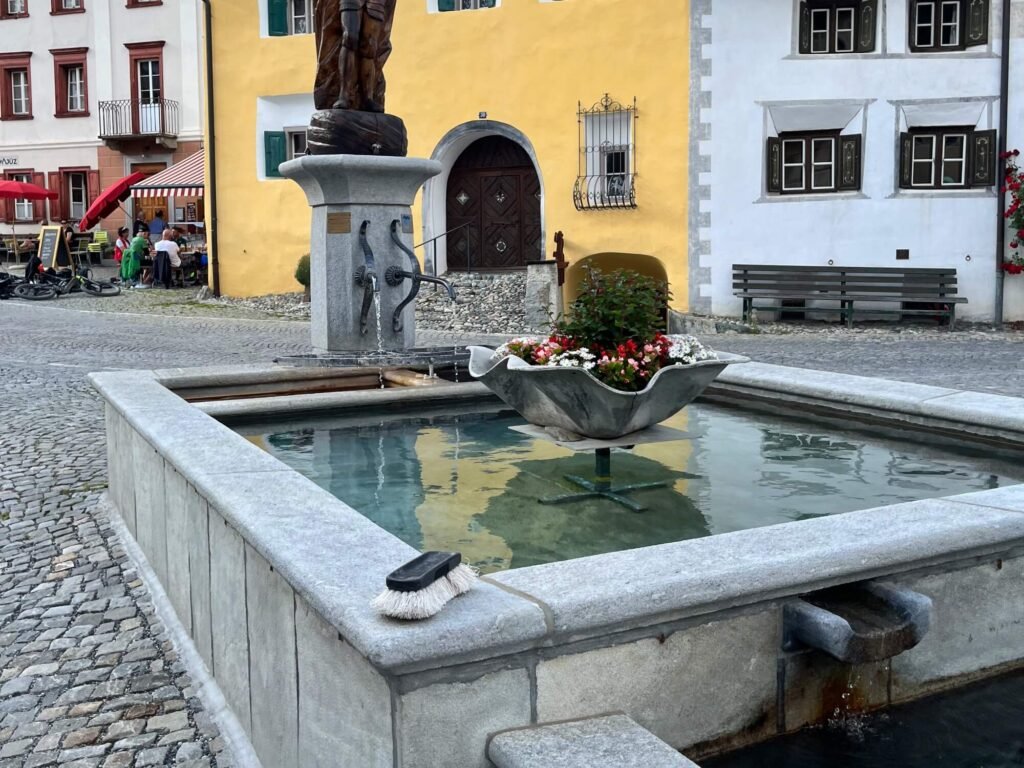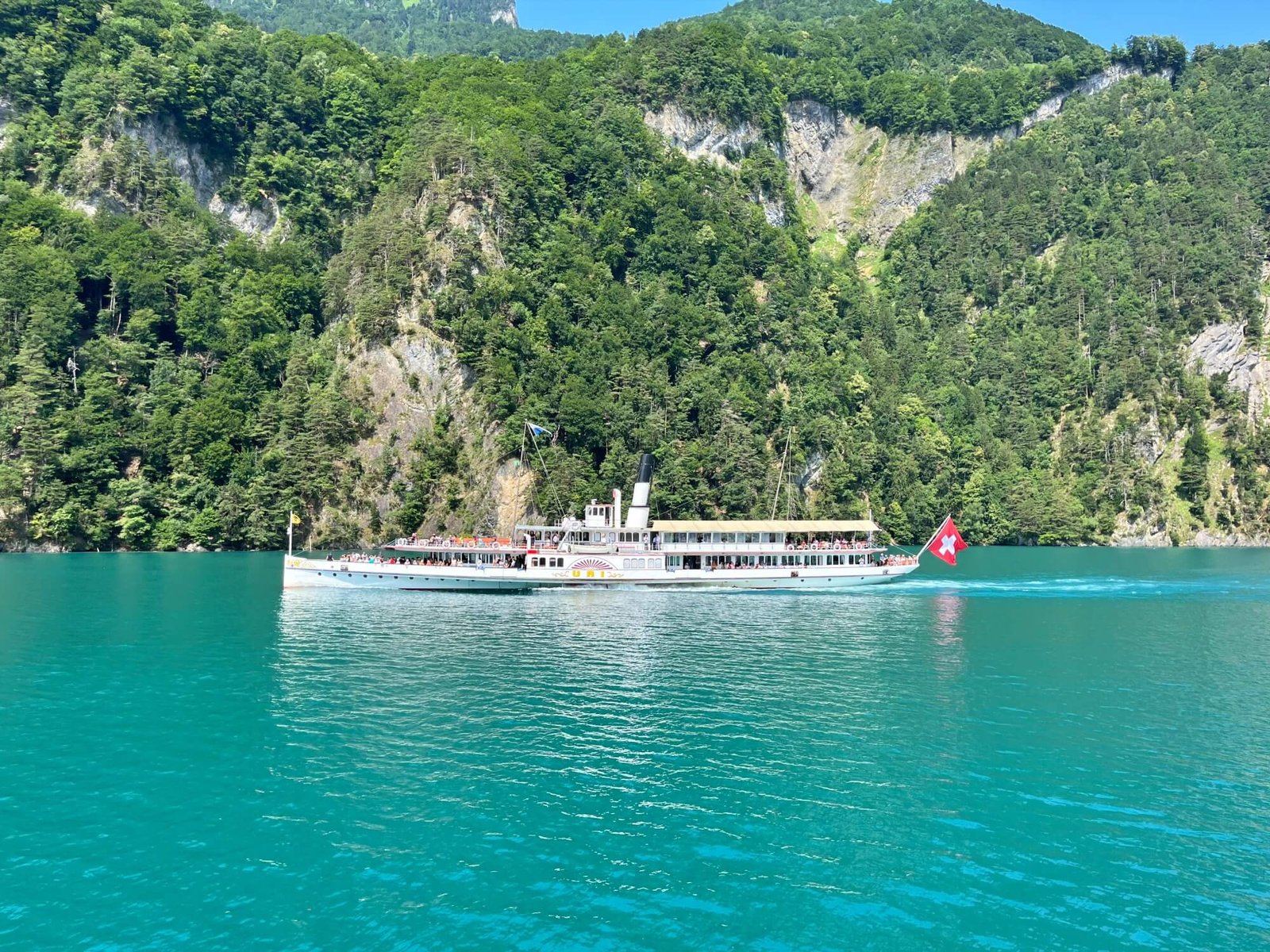A very common question that many travelers ask before visiting Switzerland is whether the tap water is safe to drink. The answer is refreshingly simple:
Yes, it is.
Switzerland is home to some of the cleanest water sources in the world and both tap water and public fountains are generally safe to drink.
The quality of Swiss tap water
Switzerland has strict water quality regulations and around 80% of its drinking water comes from natural springs and groundwater. The remaining portion is sourced from lakes but it undergoes thorough treatment and regular testing.
In practice, this means that when you pour yourself a glass of tap water in a Swiss hotel, restaurant or apartment, you’re often drinking water that has been naturally filtered through alpine rock.
It’s no exaggeration to say that the tap water in Switzerland is as good, if not better, than most bottled water. So you can save yourself the trip to the supermarket to buy water.

80% of the Swiss drinking water comes from natural springs and groundwater.

The rest is sourced from our lakes.
Drinking fountains in Swiss cities
One of the loveliest features of Swiss towns and cities is their public fountains.
Zurich alone has over 1200 fountains that provide free drinking water. Bern, Basel, Geneva and Lucerne also have countless fountains scattered through their streets. Most of these are fed by the same high-quality water system that supplies homes.
When a fountain provides potable water, there is usually a small sign or plaque saying Eau potable (French), Acqua potabile (Italian) or Trinkwasser (German). If water is not drinkable, the fountain will be clearly marked with a warning such as Kein Trinkwasser. As a rule of thumb, unless you see such a warning, you can assume the water is safe.
By the way, how cool is this fountain guide that the city of Lucerne created! It helps you find the nearest fountain and even has additional information about each fountain.

This fountain in Scuol even “serves” natural mineral water. No joke!

Even in winter you’ll find a place to fill your bottle.
Sustainability and cost savings
For travellers, being able to drink tap water has two big advantages: it saves money and reduces waste.
Instead of buying plastic bottles, you can carry a reusable bottle and refill it throughout the day. This not only keeps you hydrated during hikes and city walks but also helps you travel more sustainably.
In fact, refilling your bottle from fountains is a small Swiss tradition. Locals do it all the time and you will often see commuters or joggers pausing at fountains for a sip.
Tap water in restaurants
In restaurants, you can safely order tap water, though practices vary.
Some places are happy to serve it for free, while others may charge a small service fee or instead encourage you to buy bottled water. Depending on where you’re from, paying for tap water might surprise or even irritate you.
A friend of mine who works in the hospitality industry once explained this to me as follows:
“I have the same amount of work wheter I pour you a glass of water or a Sprite. I need to take out the glass, pour your water, take it to your table and wash it afterwards. So our guests are not necessarily paying for the water itself but for the service.”
However, ususally, when you buy something else to drink and ask for a glass of tap water on the side, they won’t charge you.
When to be cautious
Although the general rule is that Swiss tap water is safe, there are a few exceptions to keep in mind:
- Remote alpine huts: Some huts rely on untreated local water sources, which might not be drinkable. Signs will usually indicate this.
- Old pipes: Very old buildings could have outdated plumbing, though this is rare and mostly addressed by local authorities.
- Marked fountains: Always respect a Kein Trinkwasser or equivalent sign.
Also, don’t drink from streams or waterfalls. I was once thirsty enough to take the risk with what looked like a super clean waterfall during a hike – only to feel super sick for the next hour. A not-so-bright moment in my life my boyfriend regularly likes to re-visit. 😂
Better carry an extra bottle when you’re up in the mountains to avoid cramps. Or, if you own a special filter you can use during outdoor activities, bring that along.

As tempting as it is, I don’t recommend drinking from water streams.

Even if it’s crystal clear.
Quick tips for travellers
My personal tips when it comes to drinking water in Switzerland are the following:
- Carry a reusable bottle and refill it throughout your trip.
- Use fountains in cities and villages unless they are marked otherwise.
- In restaurants, don’t hesitate to ask for tap water, but expect varying responses.
- If hiking, check with locals or hut wardens before drinking directly from their fountains or small mountain sources.



